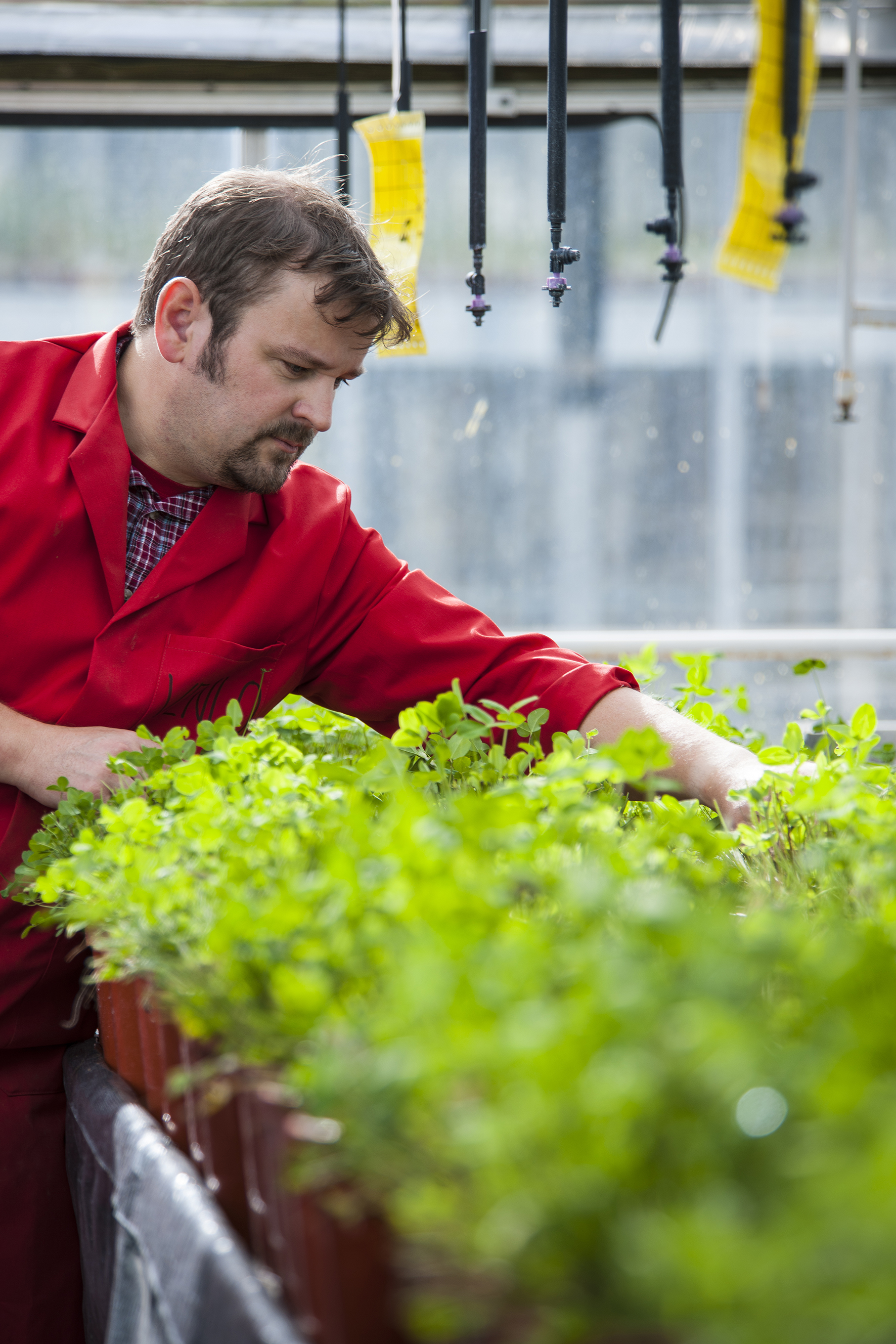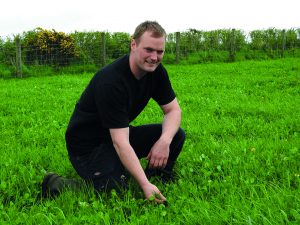Farming
Red clover innovation for Wales

NEW research to ensure more Welsh livestock farmers could benefit from longer lasting, disease resistant red clovers is being undertaken at Aberystwyth University’s Institute of Biological, Environmental and Rural Sciences (IBERS).
The three-year Welsh Government (WG) and European Regional Development Fund (ERDF)-funded project is looking at ways to improve protein production and utilisation on farms in Wales through improved forage crops.
Professor Leif Skot, head of forage plant breeding at IBERS, is leading the project, whose partners are WG, ERDF, Germinal Holdings, HCC and Farming Connect.
As part of the project, Professor Skot and his team are looking at how red clover production and persistence can be improved, helping farmers to improve their silage crop value. In turn, this could go some way in helping farmers reduce the need to buy-in as many expensive concentrates.
Historically, some producers have been drawn away from red clover due to a tendency for yields to drop off after a couple of years. To solve that problem, scientists developed varieties which focused on improved yields and better persistence so they yield well into their fourth and fifth harvest.
However, prolonging the productive life of the plant increases the risk of another problem red clover faces, which is where this new project is currently focused.
Professor Skot explains: “One of the biggest issues is that red clover is susceptible to trampling, and if the plants get damaged then they are susceptible to disease. White clover is stoloniferous, which means it grows by stolons [small roots] which spread across the soil surface and allows the plant to fill in any gaps in the sward. Red clover plants, on the other hand, grow from a single growing point, the crown. That means that once the crown is damaged and the plant succumbs to disease, the remaining plants aren’t able to compensate and fill in the gaps, leading to a loss in yields.”
In a bid to counter this, Professor Skot and his team are developing resistance to the two major diseases responsible for red clover loss: Stem Nematode and Crown Rot (Sclerotinia).
They hope that by developing disease-resistant plants, they can create a more robust, productive plant.
“Stem Nematode and Sclerotinia are soil-borne pathogens for which we have no recognised chemical control. The current solution is to take a long gap in the rotation to minimise the potential risk of the problem,” adds Paul Billings of Germinal. “This research project is looking at whether we can select material which is more resistant to each of these diseases, and then combine them to create varieties resistant to both pathogens.”
Professor Skot says he and his team have carried out several generations of selection for Stem Nematode and Sclerotinia. They are now at the stage where they will combine the resistance to one population so it can be tested in the field.
While it is high-yielding and produces high-quality forage from the first year, red clover does need to be managed in a way which will improve its resistance, Professor Skot adds.
“The crown of the plant is susceptible to damage, so we are looking at improving its structure.. Our research shows that if they have compact crowns then they are more resilient to damage from machinery and compaction from animals or grazing. The major management technique is not cutting below 5cm and not overgrazing so that the crown isn’t damaged.”
With the correct management, red clover can yield between 22 and 25 tonnes of dry matter per hectare per annum when sown with grass, with clover content able to reach as high as 20 tonnes of dry matter in the first year.
“It’s high-yielding and high-quality from the first year, which is one of the great things about the crop. By minimising the problem areas, we can hopefully give Welsh farmers a way to produce more of their own protein on-farm,” he says.
This project aims to help deliver on the Welsh Government’s Well-being of Future Generations Act, one objective of which is to drive sustainable growth. It also contributes to its Economic Action Plan which encourages greater R&D and innovation.
RED CLOVER CASE STUDY
The Cowcher family from Penrhiw, Ceredigion, a Farming Connect Focus site, has seen the advantages of growing red clover on their farm for over a decade, but the introduction of long-lasting varieties would boost the benefits of the crop even further.
“We’ve been using red clover for more than ten years since we converted to organic production,” says Phil Cowcher, who farms beef and sheep with his parents across 500 acres (202ha) of part-owned, part-rented and part share-farmed organic farmland.
“It gives us high yields of good-quality forage, which can be difficult in organic systems, and it suppresses weeds because it’s very vigorous – if we get creeping thistles it smothers and gets rid of them,” he says. “Red clover is also important for fixing nitrogen. Cereals following red clover systems seem to yield very well, and it has deep tap roots so it breaks up the compaction.”
Phil believes planting with a cereal reduces competition from weeds during establishment, as the cereal acts as a nurse crop.
The 45 acres (18ha) of red clover is used by both the farm’s beef and sheep enterprises. The calves – produced by the 60-head, mainly Stabiliser suckler herd – tend to be fed the second and third cuts, as part of the growing and finishing rations.
The first cut, which usually has a higher grass content and metabolisable energy, is usually fed to pregnant ewes late in their pregnancy. Towards the end of the growing season, the red clover leys are rotationally grazed by lambs.

In clover: Phil Cowcher at Penrhiw
Phil adds: “For the calves, I like to feed two-thirds red clover with a third barley and peas for fibre. If it’s alone then it’s a bit rich, but by combining it with barley and peas it seems to complement the clover well.
“We make sure lambs are introduced gradually to the red clover when they first graze it. Once they’ve adjusted to the diet, growth rates are good and they usually finish well – we start selling in June at around 19kg and the last ones go by October.”
Phil believes management is fairly simple but stresses the importance of sowing in a fine seedbed when soils are over 10℃. If there’s a cold spring then cereals are planted first and the red clover ley is sown on top with a grass harrow/air seeder, into the growing crop, once soil temperature is high enough.
“When we cut it we have to make sure we don’t cut it too low, and we have to be careful not to overgraze it and damage the crown too. But for us, red clover’s a high-quality, high yielding crop and we’ll definitely carrying on growing it,” Phil concludes
Community
Celebrating nature recovery through Cysylltu Natur 25×25

A CELEBRATION event was held on Saturday, January 24 in Cwm Gwaun to mark the achievements of Pembrokeshire Coast National Park Authority’s Cysylltu Natur 25×25 project, bringing together volunteers, farmers and staff involved in delivering nature restoration across North Pembrokeshire.
The landscape-scale project was funded by the Welsh Government through the Nature Networks Programme, delivered by the Heritage Fund. The Programme aims to strengthen ecological connectivity and resilience by restoring habitats at scale.
Those attending the event heard about the wide range of conservation activity delivered through the project across the north of the National Park. This has included practical works to restore grazing to Rhos pasture to benefit marsh fritillary butterflies and southern damselflies, specialist work to conserve rare lichens, volunteer chough, dormouse and harvest mouse monitoring, safeguarding greater horseshoe bat hibernation sites, and targeted action to tackle invasive species threatening important sites.
Volunteers, farmers, land managers and contractors played a vital role in the success of the project, contributing local knowledge, practical skills and ongoing commitment to caring for Pembrokeshire’s unique landscapes and wildlife in the long term.
Mary Chadwick, Conservation Officer for Pembrokeshire Coast National Park Authority, said: “Cysylltu Natur 25×25 has shown what can be achieved when farmers, volunteers and conservation specialists work together with a shared aim.
“From monitoring some of our most elusive species to restoring and protecting habitats, the dedication of everyone involved has made a real difference for nature across the National Park.”
Although the Cysylltu Natur 25×25 project is now coming to an end, the important work it has supported will continue. Building on its successes, Pembrokeshire Coast National Park Authority will carry this momentum forward through the next phase of nature recovery work under NNF4 Cysylltiadau Naturiol / Naturally Connected, ensuring ongoing protection and enhancement of habitats for future generations.
Farming
Judicial review granted for hundreds of farmers and landowners in Wales

OVER three hundred Welsh farmers and landowners have been granted the right to legally challenge Green GEN Cymru’s ‘unlawful behaviour’ at the High Court.
The collective filed a judicial review application on behalf of the community groups, Justice for Wales and CPRW, on four separate grounds, including claims that the energy company has acted unlawfully and with disregard for biosecurity and the environment, while trying to gain access to private land to conduct surveys for three major overhead pylon routes.
The proposal will see the energy infrastructure and pylons spanning 200 km across Powys, Ceredigion, Carmarthen, and Montgomeryshire in Wales and across the Welsh border into Shropshire, in the West Midlands of England.

Mrs Justice Jefford granted permission on four grounds – including abuse of power and procedural impropriety – during the three-and-a-half-hour hearing at Cardiff Civil Justice Centre on Tuesday, January 20.
A two-day hearing is expected to take place in April 2026, date to be confirmed.
The judge also accepted an undertaking from Green GEN Cymru that it would not enter land using s.172 powers – the right given to acquiring authorities to enter land to conduct surveys or valuations under the Housing and Planning Act 2016 – until an urgent interim relief application hearing can be held.
Natalie Barstow, founder of Justice for Wales, said: “This is a moment of vindication. For months, we have been left feeling unsafe in our own homes and stripped of our power as farmers and landowners.
“This is not a protest against renewable energy; this is about standing up for what is right. Our right to dignity and to have a voice, and for the future of our land, wildlife, and livelihoods.
“Since we began this battle, hundreds of other farmers and landowners across Wales have come forward with similar stories, and we’ve been supported by many generous donations to fund the legal challenge. We knew we weren’t alone in our concerns, but the response demonstrates it is a far wider issue than we initially feared, and why it is so important that Green GEN’s conduct and protocols are properly scrutinised.
“We said we will not be bullied into submission, and this judgment is just the first foot forward in our fight for justice.”
Mary Smith, a lawyer at New South Law, the law firm representing the impacted communities, said: “Holding acquiring authority status does not entitle a company to disregard the limits of its statutory powers or the rights of the people affected.
“The Court’s decision confirms that Green GEN Cymru must be held to the same legal standards as any other public body when exercising intrusive powers over private land. This case is about restoring fairness, accountability, and respect for the communities whose livelihoods and environments are at stake.”
Farming
New rules to make Welsh lamb pricing clearer set to begin next week

Mandatory carcass grading and price reporting will be required in slaughterhouses from Wednesday, January 28
WELSH sheep farmers are set to see new rules introduced next week aimed at making the lamb market fairer and more transparent.
From Wednesday (Jan 28), slaughterhouses in Wales will be required to classify sheep carcasses and report prices using a standardised system. The Welsh Government says the move will improve consistency in grading, make price information easier to compare, and help build confidence for farmers selling stock.

Deputy First Minister Huw Irranca-Davies announced the change during the Farmers’ Union of Wales (FUW) Farmhouse Breakfast event at the Norwegian Church in Cardiff.
He said the measures would support the industry by ensuring a consistent methodology for classifying carcasses in slaughterhouses, promoting transparency, fairness and productivity within the sheep market.
“Our iconic Welsh lamb is celebrated around the world for its outstanding quality and high production standards,” he said. “These measures will implement a consistent methodology for classifying sheep carcasses in slaughterhouses, promoting transparency, fairness, and increased productivity within the sheep market.”
The regulations bring the sheep sector into line with rules already used for beef and pork.
Hybu Cig Cymru – Meat Promotion Wales chief executive José Peralta said the changes would allow for greater data capture and analysis and improve transparency within the supply chain.
He said: “The new regulations, which now align with a similar position for cattle and pigs, will allow for greater data capture and analysis to be undertaken and support increased transparency within the sector. As a sector we must seek all opportunities for greater transparency within the supply chain to ensure that choices can be made from an informed position.”
The Welsh Government says the new approach is part of a wider UK framework, with similar arrangements already operating elsewhere.
During his address, the Deputy First Minister also pointed to further changes expected in 2026, including the planned introduction of the Sustainable Farming Scheme, which the Welsh Government describes as a new partnership between the people of Wales and farmers.
The scheme is intended to support the sustainable production of food while also responding to the climate and nature emergency.
The Welsh Government has also confirmed its commitment to financial support during the transition, with up to £238 million committed to the Universal layer and the legacy Basic Payment Scheme in 2026.
Deputy First Minister Huw Irranca-Davies said: “I would like to reiterate the Welsh Government’s commitment to supporting Welsh family farms, not just in the short term but also in the long run. Our goal is to prioritise stability for the farming industry, ensuring to balance this with sustainability at its very core.”
He added that supporting farmers through the change would be a priority, with consistent advice and support offered across the sector.
Building fairness within the agricultural supply chain remains a key Welsh Government priority, which it says is also integral to food security.
-

 Health6 days ago
Health6 days agoConsultation reveals lack of public trust in health board
-

 Community7 days ago
Community7 days agoPembrokeshire students speak at national Holocaust Memorial Day event
-

 News1 day ago
News1 day agoPrincess of Wales visits historic Pembrokeshire woollen mill
-

 Crime5 days ago
Crime5 days agoPembroke man accused of child sex offences sent to Swansea Crown Court
-

 Community6 days ago
Community6 days agoCampaign to ‘save’ River Cleddau hits over 2,200 signatures
-

 Health3 days ago
Health3 days agoDoctor struck off after sexual misconduct findings at Withybush Hospital
-

 Health7 days ago
Health7 days agoAmbulance called after ‘drop of mouthwash’ swallowed as 999 abuse highlighted
-

 Crime7 days ago
Crime7 days agoFormer soldier jailed for stalking police officer over past arrest


























